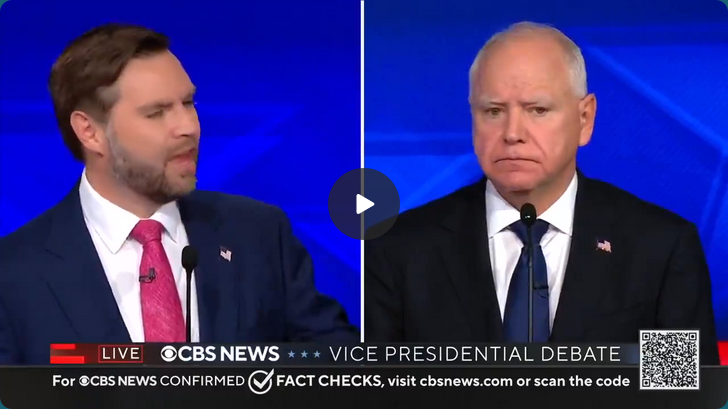In the visible portion of a pay-walled post, Andrew Doyle explains why we should stop using the hoary old anti-free speech cliché that was refuted nearly 50 years ago by the US Supreme Court:
There are few people who are courageous enough to openly admit that they oppose freedom of speech, and so we would be forgiven for thinking that the authoritarian mindset is rare. In truth, those who believe that censorship can be justified typically resort to a set of hackneyed and specious arguments. It doesn’t seem to matter how often these misconceptions are conclusively rebutted, they continue to be trotted out with depressing regularity.
Take yesterday’s Vice Presidential debate between JD Vance and Tim Walz, in which one of these very misconceptions was parroted once again. This is how it happened:
JD Vance: You guys attack us for not believing in democracy. The most sacred right under the United States democracy is the First Amendment. You yourself have said there’s no First Amendment right to misinformation. Kamala Harris wants to …
Tim Walz: Or threatening, or hate speech …
JD Vance: … use the power of government and big tech to silence people from speaking their minds. That is a threat to democracy that will long outlive this present political moment. I would like Democrats and Republicans to both reject censorship. Let’s persuade one another. Let’s argue about ideas, and then let’s come together afterwards.
Tim Walz: You can’t yell fire in a crowded theatre. That’s the test. That’s the Supreme Court test.
The cliché that “you can’t shout ‘fire’ in a crowded theatre” originates in the 1917 United States Supreme Court ruling against Charles Schenck, a socialist who had issued a broadside calling for young men to refuse military conscription and was convicted under the Espionage Act. These were the circumstances under which Justice Oliver Wendell Holmes wrote the statement: “The most stringent protection of free speech would not protect a man in falsely shouting ‘Fire!’ in a theatre and causing a panic”. Note that the word “falsely” is invariably dropped when quoted by advocates for censorship.
Leaving that telling little edit aside, it should be remembered that this was never a legally binding statement. Walz maintains that this is “the Supreme Court test”, but Holmes merely used the analogy to justify upholding Schenck’s prosecution. In fact, the decision of the court in Schenck v. United States was overruled in 1969.
Do I need to say that I didn’t watch the debate? I don’t even watch the debates when I actually have a vote to cast, so I’m going on highly selective sources to at least pretend to care about the VP debate. I do like a waspish line on almost any politician, so Bridget Phetasy’s description gave me a mental image of the event that seems highly truthy: “The vibe of this debate is adult confronting the coach who molested him”. J.D. Tuccille has more:
To illustrate the contrast between the recent presidential debate and this week’s vice-presidential match, I’ll say that I dread either Donald Trump or Kamala Harris taking office as president, but I fear the policies of veep hopefuls J.D. Vance and Tim Walz. At the top of both party’s tickets are individuals of uncertain competence and shaky basic decency, while their sidekicks come off as the designated adults, ready to step in if the winning presidential candidate falters, and more than excited to implement their chosen programs, God help us. That said, Vance had a much better night than Walz.
From the very beginning, J.D. Vance gave us a glimpse of what Trump might be like minus a personality disorder and with focus. He looked cool and collected, with his arguments organized in his head. He was also able to quickly pivot to address — or dodge (this is politics, after all) — the CBS moderators’ questions.
By contrast, Walz appeared like he was sweat-soaking his notes into illegibility as he tried to remember which part of the previous night’s memorized cram session he should spit out. He eventually regained some of his footing, though he generally seemed nervous and unprepared.
“The vibe of this debate is adult confronting the coach who molested him,” quipped podcaster and writer Bridget Phetasy, who isn’t known for being merciful.
The Democrat’s discomfort probably came to a head when he was asked to explain why he long claimed to have been in Hong Kong in 1989, with front-row seats to the Tiananmen Square massacre, when news reports and photographic evidence showed he was at home in Nebraska. Much hemming, hawing and references to a small-town upbringing ensued, which was painful to watch. The closest he came to admitting he lied was conceding, “I’m a knucklehead at times” and that he “misspoke.”




